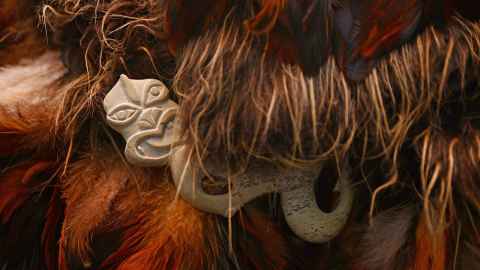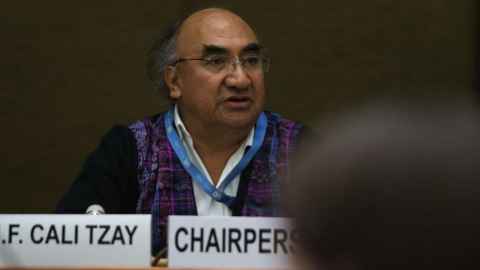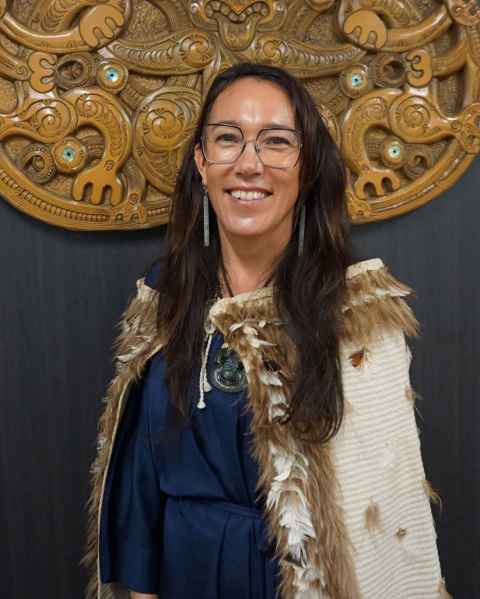Indigenous rights in the spotlight at constitutional conference
20 March 2024
Thought leaders are coming together at Waipapa Taumata Rau to discuss practical steps towards designing an inclusive constitution for Aotearoa New Zealand.

The UN Special Rapporteur on the Rights of Indigenous Peoples Francisco Calí Tzay is conducting an academic visit to Aotearoa New Zealand to participate in the Designing our Constitution conference at the University of Auckland this April.
The conference, jointly hosted by the University’s Centre for Indigenous Peoples and the Law, Te Kāhui Tika Tangata Human Rights Commission and National Iwi Chairs Forum, is part of a series of hui inspired by the landmark report Matike Mai, and in memory of Dr Moana Jackson.
Over two days, thought leaders from across the country, including Professor of Māori studies Margaret Mutu and Indigenous rights and constitutional law specialist Professor Claire Charters, will come together to discuss the state of Indigenous rights in Aotearoa.
Conference attendees will focus on the practical steps towards designing an inclusive constitution for Aotearoa. The speakers and panellists will explore constitutional design questions, potential structures and procedures and will identify concrete actions that whānau, hapū, iwi, organisations and individuals can consider, build support around or implement themselves.

UN expert on Indigenous Peoples’ rights Calí Tzay will speak about his experiences with countries like Ecuador, Bolivia, Colombia, Sweden, Finland, and Canada, where constitutional arrangements recognise and empower Indigenous governance alongside that of the government.
In addition to taking part in the conference, he will visit sites of long-running legal cases against the Crown, including Nelson to meet with representatives of the customary Māori owners of the Nelson Tenths Reserves, and Wairarapa Moana. In both cases, iwi or hapū have won High Court or Supreme Court cases against the Crown, but instead of accepting the legal decision and working towards a resolution, the Crown is either baulking at the provision of redress or has created legislation to override the court ruling.
The University’s Director of Te Puna Rangahau o Wai Ariki, Centre for Indigenous Peoples and the Law, Professor Claire Charters, says the cases are a serious miscarriage of justice.
“These modern-day experiences of iwi and hapū highlight how readily Parliament can override human rights, especially Indigenous peoples’ rights.
“It’s a serious flaw in the current system of government in Aotearoa. It is something we are asking the Special Rapporteur and other UN bodies to continue to engage with our Government about.”

Designing our Constitution
The Commission’s Tino Rangatiratanga Shared Leader Julia Whaipooti says the conference will discuss proposals for a constitution that can create a place of belonging for everyone in Aotearoa, while recognising the authority and tino rangatiratanga of Tangata Whenua, on an equal footing with the Government.
The visit and conference come as New Zealand’s human rights record is due to be scrutinised before the United Nations Human Rights Council in Geneva for its five-yearly review in late April.
Whaipooti says the dozens of countries involved in the review are already engaging with the Commission and community groups about key human rights issues in Aotearoa New Zealand.
“I think a lot of countries are concerned that the Government has reneged on its commitment to the United Nations Declaration on the Rights of Indigenous Peoples.
“At the end of the day, Indigenous rights are human rights, and we must work together to protect them,” says Whaipooti.
Read more about the event, the Nelson Tenths Reserves and Wairarapa Moana kaupapa.
The public can hear from UN Special Rapporteur Calí Tzay at a public lecture on Thursday 4th April at the University of Auckland.
The conference (sold out) is a partnership between: Te Kāhui Tika Tangata Human Rights Commission, the National Iwi Chairs Forum and Te Puna Rangahau o Te Wai Ariki | Centre for Indigenous Peoples and the Law, University of Auckland.
Funding support has been provided by J R McKenzie Trust and Te Wānanga o Raukawa.
Media contact
Sophie Boladeras | Media adviser
M: 022 4600 388
E: sophie.boladeras@auckland.ac.nz